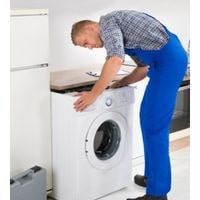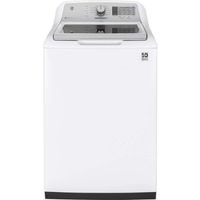Ge Washer Stops Mid Cycle. When your washer stops mid-cycle it can create a frustrating problem that will delay the entire washing process.
There are Appliance Repair companies that can help you get to the bottom of this situation which is not only irksome but inconvenient.
Before troubleshooting in general, it’s important to have your user manual handy and have
unplugged your appliance as been instructed so you can clean out any clothing that might be stuck in the treads along with other fibers stuck around other parts of your washer.
Ge Washer Stops Mid Cycle

This article discusses the problem of a Ge washer that stops in the middle of a cycle.
Timer Malfunctions
A defective timer might be the reason why your washer stops mid-cycle.
To find out if this is the case you’ll need to remove the rear panel in your washing machine’s control board and isolate what appears damaged.
Check your user manual for a diagram of how everything works so you can check that the wiring on your timer isn’t damaged.
If it turns out that some wires are damaged, or there is simply no continuity when testing the timer with a multimeter, you might need to replace or repair the timer; do whichever is the most cost-effective to prevent it from happening again.
Problem With Door Lock
Like the Switch Assembly, the door lock prevents an error from occurring if there is a missing or malfunctioning door latch. If a door lock error occurs, your washer will stop mid-cycle.
A common sign of this problem includes when the plastic lever on the interior of your washer which releases the locking mechanism becomes loose or breaks.
The second indicator is that you can simply nudge or jiggle the handle to force it open from its locked position.
Test if the plastic switch contacts are missing by checking with a multimeter set to continuity using the no-volt test setting between left and right probes on your multimeter. There should be a tone indicating that continuity exists.
Pump/Motor Failure
If your pumps have failed, it will cause the washer to stop mid-cycle. Open the access panel in the back of the washer, and visually inspect the pumps.
Check for signs of damage on the motors or belts; listen for strange sounds coming from the motor or pumps these are often signs that something mechanical has gone wrong. If a pump or motor fails, it will need to be repaired or replaced.
Hose Clogged Error
A clogged washing machine hose can stop your machine mid-cycle. To remove debris from the hose, you should disconnect it from the bottom of your washing machine.
You may have to remove a panel to access the bottom of your washer. You’ll need a flashlight if you can’t see inside well.
The nozzle is typically located on top of your washer and you may need to look behind it while you pull the hose out with one hand.
Inspect the exterior of the hose for any signs of damage before attempting to use it again by reconnecting it at the back of your washing machine.
Assemblies For Lid Switches
The lid switch assembly prevents the washer from spinning while the lid is open. If the lid switch assembly fails, the washer may stop mid-cycle.
Remove the rear panel to gain access to the switches and check continuity with a multimeter by pressing each of the switches to test for continuity on each of these parts.
If one does not show a change in resistance, replace these faulty parts as they are likely defective and need replacing before use.
Valve For Water Inlet
If the water inlet valve is kaput, or not working as it should be it will take an abnormally long time for it to allow the water to enter, and then your overall wash cycle will slow down considerably.
To test whether or not the problem lies with this vital mechanical component you want to grab yourself a handy multimeter and then proceed by using it to check.
If there is any continuity between these two terminals here which you’ll use your metal probes on. If there’s no connection whatsoever that means that this part has broken down and needs replacing.
Defective Main Control Board
The control board in your appliance may be defective. Usually, when this is the problem, it’s because of another part that caused the control board to act up (like a thermostat).
To narrow down the cause of the problem, look at all other parts that might have triggered this control board failure and replace only those.
Related Guides

